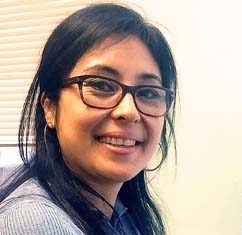
Community Outreach Coordinator of IIBA’s Fremont office, Hangama Asefi has intimate knowledge of the traumas many immigrants face.
In 1996, Hangama’s father, a professor at Kabul University, was being persecuted by the Taliban for not belonging to a religious group. “I remember Taliban soldiers entering my family’s home late at night and heading towards my father’s library. The soldiers believed my father was a German spy because the books in his library were written in German and he did not have a Quran in his bookshelf.” The soldiers detained and interrogated Hangama’s father for two days. He returned home badly beaten and fatigued. The soldiers who had escorted him home were former students of her father, who told the family that the only way they could save Hangama’s father’s life was by fleeing Afghanistan. Desperate for his safety, the family set out for Pakistan. Unfortunately, Hangama’s father’s encounter with the Taliban had left him sick and depressed. “My father passed away three months after we arrived at a Pakistani refugee camp. My family and I were living in the streets of Pakistan, and people said that with the passing of my father we had lost our passage to the U.S.” Hangama’s relatives in the U.S. did not give up hope. “My aunt got in contact with the office of former congressmen Pete Stark who assisted in the process that eventually granted my family and me refugee status in the U.S.”
Hangama’s experience with the agencies that helped her family left a lasting impression. “As a newcomer you feel lost and you need people to help you. Even though I arrived in the U.S. with documentation, I still felt as if I did not belong. I wanted to take what I had learned and tell immigrants and refugees that they deserve to be here and their voices matter.”
After graduating from U.C. Berkeley, Hangama, who had used IIBA’s services to adjust her status from refugee to legal permanent resident, joined the IIBA staff, helping open a satellite office in Fremont. “I was excited to be able to help the Afghan community in Fremont. The Afghan people have been betrayed by foreigners for more than 200 years, so when they seek immigration legal services they are cautious about working with people who do not speak their language.” Hangama has spent the last two years building trust and educating the different immigrant sectors in the city of Fremont. Her goal is to ensure that the Fremont Office, which is now open only Mondays and Tuesdays, becomes a full service office, open five days a week. “When I arrive at the office every Monday, people are waiting. This is a good sign.”
